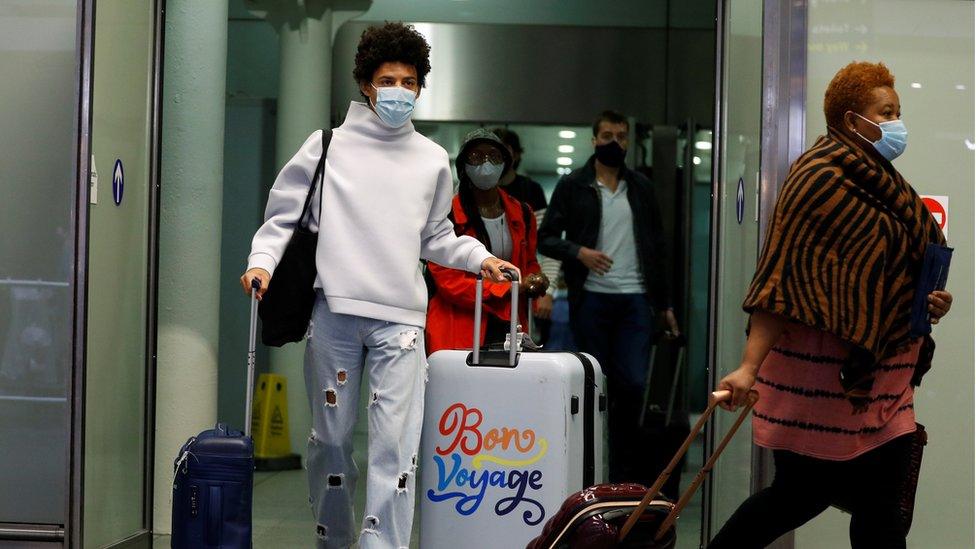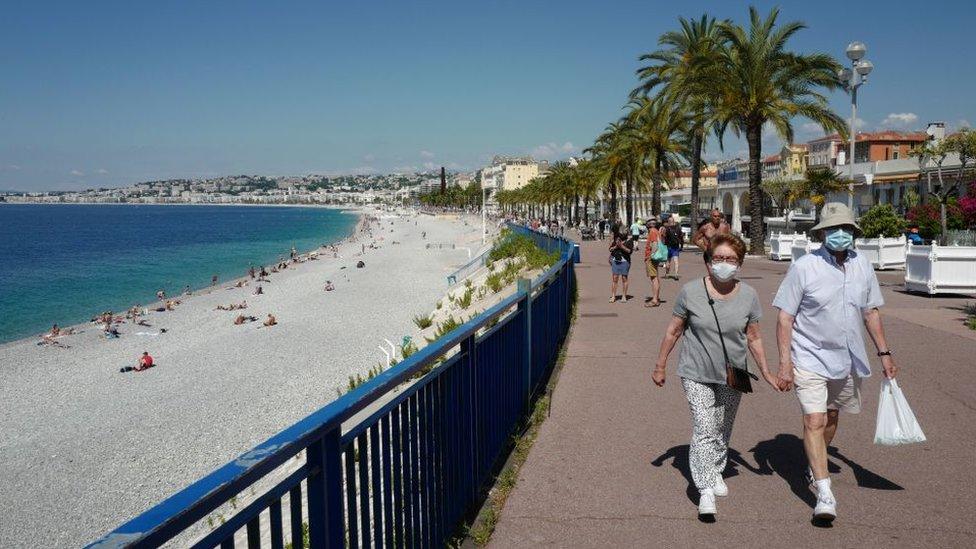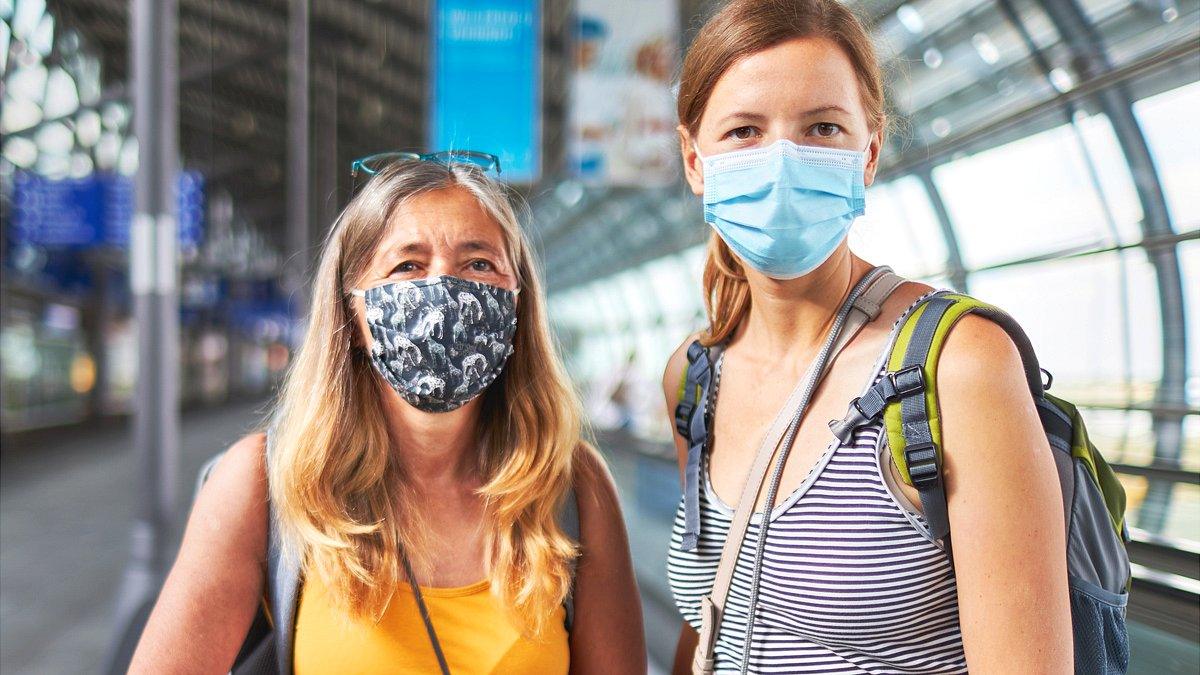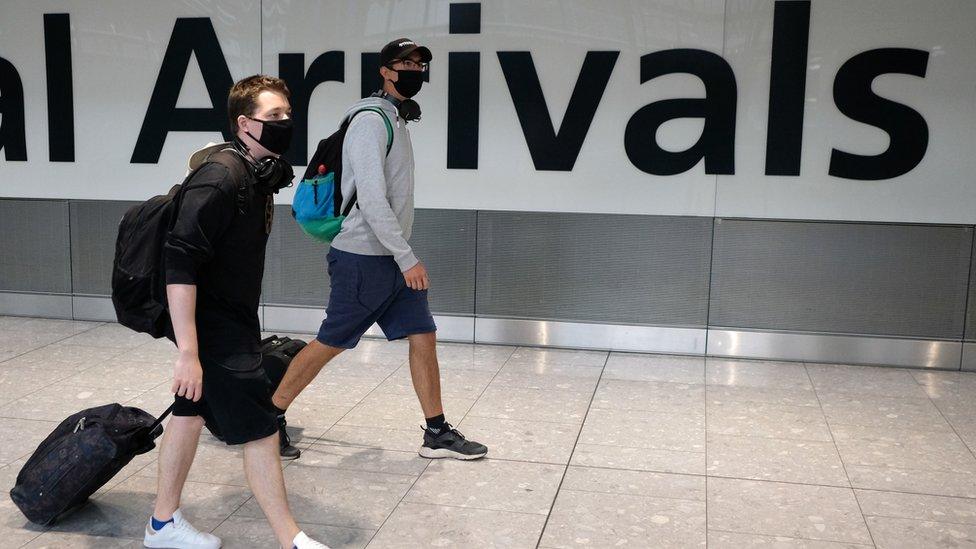Coronavirus: France to be added to UK quarantine countries
- Published
Transport Secretary Grant Shapps explains decision behind France quarantine rules
Thousands of holidaymakers have seen their plans thrown into chaos after UK quarantine measures were imposed on France from Saturday.
The 14-day isolation requirement from 04:00 BST also now applies to people arriving from the Netherlands, Monaco, Malta, Turks and Caicos, and Aruba.
It comes after France's prime minister acknowledged infection numbers were going "the wrong way".
France warned it would take "reciprocal measures".
Clement Beaune, France's secretary of state for European affairs, tweeted that the UK's decision was a matter of "regret" for the French, external.
Transport Secretary Grant Shapps said the decision was triggered when the rate of infection in the affected countries exceeded 20 cases per 100,000 people over seven days. The quarantine requirement was previously applied to Spain, another popular destination for UK holidaymakers, at the end of July.
"We've worked so hard in this country to get our level of infections down, the last thing we want do is to have people returning and bringing the infection with them. It's to protect everybody," Mr Shapps told BBC Breakfast.
There are about 160,000 British holidaymakers currently in France, he said. The deadline is expected to induce a rush to ports and airports, with thousands of tourists desperate to avoid quarantine.
Others who cannot return in time face disruption to work or schooling.
Katie, a teacher on holiday in the south of France, told the BBC that the 12-hour drive to the Channel crossing means she has no chance to return in time, so she and her children will miss the start of term.
"We have done everything the government has asked of us for months but I really think they need to treat us all with a little respect and give us time to organise ourselves so that we can continue with our jobs, and our children with their lives," she said.
Eurotunnel said its Channel Tunnel trains were fully booked until Saturday. Earlier, customers had faced long queues to access the website.
Mariana Fabricante, who is trying to return from the mountain resort of Tignes with her family, said: "Every time I try to change the ticket, the website is busy. People would be able to make informed decisions if they had been told in advance. It's annoying and frustrating."
John Keefe, director of public affairs at Getlink, which operates the Channel Tunnel, warned people not to travel to the terminal without a confirmed booking. "There is no space available," he said.

Eurostar passengers arriving at St Pancras, having beaten the quarantine deadline
Prices of some flights to the UK from Paris were more than £450, compared to £66 on Saturday. Many direct flights from the south of France are sold out.
The cheapest Eurostar tickets were £210, compared with £165 on Saturday.
But DFDS Ferries said it had added an extra four departures from Calais to help Britons return in time. It said bookings must be made before arriving at port.
Some holidaymakers said they would accept the quarantine restrictions on their return instead.
Jonathan Fieldsend from Woodbridge in Suffolk, who is not due to return from France with his family until 18 August, said: "We came fully accepting the risk we were taking of quarantine being introduced. We are not going to be rushing back."
Airlines UK described the quarantine restrictions as "another devastating blow to the travel industry already reeling from the worst crisis in its history".
The UK's ambassador to France, Lord Llewellyn, acknowledged that the new quarantine rule would be "unwelcome news" for Britons in the country, external, but stressed that people could continue with their holidays as long as they follow safety precautions and self-isolate on their return.
Shadow home secretary Nick Thomas-Symonds said while the Labour party supports "evidence based measures" at the border, it was "vital" that No 10 had a "joined-up strategy" and "urgently" puts in place a specific deal to support the heavily impacted travel sector.
The MP added: "That the government has still not put in place an effective track, trace and isolate system has made matters far worse and made it more likely that we are reliant on the blunt tool of 14-day quarantine."
He called on Downing Street to publish science behind its decisions, "and details of any work being done to reduce the time needed to isolate through increased testing and other measures".
Coronavirus: How to fly during a global pandemic (this video reflects the rules before the hotel quarantine was introduced in the UK)
According to the data company Statista, people from the UK paid 10.35 million visits to France, external last year, putting it second behind Spain - with 18.12 million - in terms of popularity.
The Foreign Office is now warning against "all but essential travel" to France - the quarantine measure was imposed for Spain on 25 July.
A list of more than 50 so-called travel corridors - allowing movement between the UK and the other countries without the need to self-isolate on return - was published at the start of last month and later expanded.
But the ending of some of the exemptions on the list follows a "significant change" in the risk of contracting Covid-19, the Department for Transport said.
It added that there had been a 66% increase in newly reported cases per 100,000 people in France since last Friday.
For the Netherlands, it was up 52%. And the increase for Malta was 105%, while it was 273% for Turks and Caicos and 1,106% for Aruba.
'Can't be complacent'
Ahead of a government meeting on the new measures, UK Prime Minister Boris Johnson promised to be "absolutely ruthless" in deciding on rules for holidaymakers from abroad.
"We can't be remotely complacent about our own situation. Everybody understands that in a pandemic you don't allow our population to be re-infected or the disease to come back in," he added.

SOCIAL DISTANCING: What are the rules now?
TESTING: Who can get a test and how?
GLOBAL SPREAD: Tracking the pandemic

On Thursday, France reported 2,524 new coronavirus cases in 24 hours, the highest daily increase since its lockdown was lifted in May.
The country's Prime Minister, Jean Castex, said on Tuesday that coronavirus numbers had been going "the wrong way" for a fortnight.
Meanwhile, the government has announced that maximum fines for people in England who repeatedly refuse to wear a face covering could double to £3,200, while organisers of illegal raves could face a £10,000 penalty.
But from Sunday, indoor theatre, music and performance venues will be able to reopen with socially distanced audiences.
Casinos, bowling alleys, skating rinks and soft play centres will also be allowed to resume, as will "close-contact" beauty services such as facials, eyebrow threading and eyelash treatments.

ALHAN'S WORLD: Health tips to keep you in good shape in these socially distanced times
WAKE UP TO MONEY: Bracing for the Covid recession

- Published15 August 2020

- Published29 November 2021

- Published11 February 2022

- Published11 August 2020
